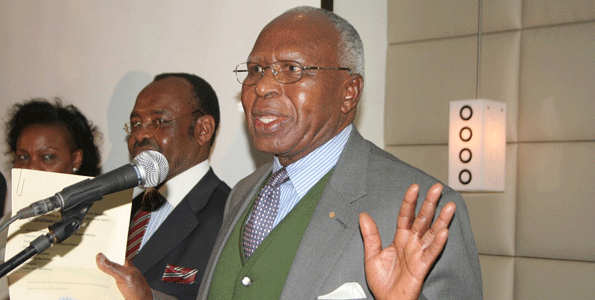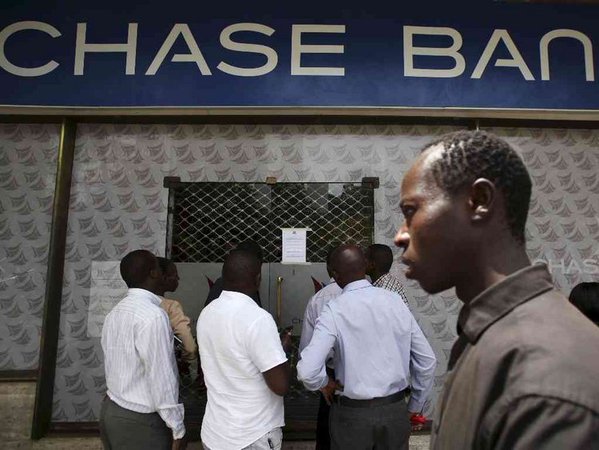Share this
Credit Bank Limited chairman Simeon Nyachae addresses guests during the Credit Bank Limited brand identity launch cocktail at Sankara hotel on September 07 2010. Photo/FILE NATION MEDIS GROUP
Nyachae-linked bank seeks Sh5.4bn diaspora buyout
- The team handling the Credit Bank private placement are Dyer & Blair Investment Bank (transaction adviser), Mboya Wangong’u & Waiyaki Advocates (legal adviser), PricewaterhouseCoopers (reporting accountant), and C&R Group as share registrars.
- The diaspora queries forced Credit Bank and FEP to cancel a planned tour to market the offer in cities such as such as London, Boston, Texas, and Seattle.
Nyachae family-linked Credit Bank is seeking an additional Sh5.4 billion from an investment group for it to take control of the third-tier lender.
The bank is wooing Fountain Enterprises Programme (FEP) to buy 30 million newly created shares — equivalent to 70 per cent of Credit Bank — via a private offer priced at Sh180 apiece and limited to members of the chama (investment club) which has a large following in the UK and US.
A section of the diaspora has opposed the deal leading to recent cancellation of a road show abroad.
FEP, which last year acquired a five per cent stake in Credit Bank after investing Sh120.5 million in a restricted offer, is seeking to take control of the lender despite queries from diaspora members on the valuation and viability of the acquisition.
“The additional capital raised through this private placement will be used to fund the expansion of the business, both locally and regionally, and ensure that we continue to deliver seamless service to our customers,” said Credit Bank chairman Simeon Nyachae in the prospectus seen by the Business Daily.
Mr Nyachae’s wife, Grace Wamuyu, also sits on the board of Credit Bank which has seven members including chief executive Chege Thumbi, Orient Bank Uganda co-founder Ketan Morjaria, and career banker Robinson Gachogu.
Credit Bank, with 14 outlets in Kenya, was in the red for the second consecutive year with a loss of Sh59.7 million in the period to December 2015 compared to a Sh91.7 million net loss a year earlier.
Buying at a premium
The team handling the Credit Bank private placement are Dyer & Blair Investment Bank (transaction adviser), Mboya Wangong’u & Waiyaki Advocates (legal adviser), PricewaterhouseCoopers (reporting accountant), and C&R Group as share registrars.
FEP members are buying the Credit Bank shares at a premium of 80 per cent considering the lender’s net asset value is Sh100 per share.
Assuming full uptake of the offer, Credit Bank will have 43.39 million issued and fully paid up shares, in what values the small lender at Sh7.8 billion.
Credit Bank had net assets (total shareholders’ funds) standing at Sh1.39 billion as at December 2015 that would value the lender at Sh4.8 billion going by Atlas Mara’s criteria which gives a 3.5 multiple on book value for those eyeing to acquire Kenyan banks.
It is these sharp differences on valuations and the financial health of Credit Bank that has seen a section of FEP diaspora members protest against the purchase of the lender, saying it was done without their knowledge.
“I did not know that FEP had invested in the bank before I read this offer. The board of directors of a company most important responsibility is to keep the shareholders who founded the company informed of any investments and plans,” said US diaspora members dubbed “Okoa FEP” in a protest note to the chama.
The diaspora queries forced Credit Bank and FEP to cancel a planned tour to market the offer in cities such as such as London, Boston, Texas, and Seattle.
Central Bank’s decision to freeze issuance of new banking licences has meant those eyeing the sector must acquire existing players, leading to high valuation of Kenyan lenders, according to an analyst.
“Freezing the issuance of new licenses has meant a rise in the value of the licence to beyond its intrinsic valuation based on traditional models such as price-to-book,” said Deepak Dave of Riverside Capital, a risk management firm.
“The focus should be on what the licence buyer intends to do rather than how much is being paid. For example, what is the means by which someone will generate the 40 per cent-plus RoE that will be needed to justify a price-to-book ratio of over three times?” he posed.
hdavid@ke.nationmedia.com




















